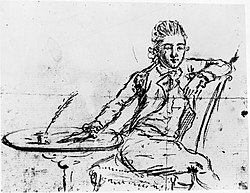The Tragedy of André
Speaking of William Dunlap’s tragedy André, my friend John W. Kennedy has created an online text of that play by transcribing the 1798 edition and annotating it. You can find it all here.
Kennedy writes:
Dunlap’s blank-verse text is accompanied by several supplemental texts:
Kennedy writes:
William Dunlap (1766–1839) dominated American theatre in his day as no one else ever did but David Belasco. He was born in Perth Amboy, and the family later moved to New York City. There is a pretty, but questionable, legend to the effect that he may have seen some of the theatrical productions in occupied New York in which John André had a hand.The result was a tragedy with a “curiously Greek construction—it is written in scenes for two or three, places all the physical activity offstage, takes place in only a few hours’ time, and really wants only a chorus to be perfectly Athenian.”
He traveled to England in 1784 to study with Benjamin West, as was practically de rigueur for aspiring young American painters, but seems to have chiefly fallen in love with the theatre there. Upon his return to America in 1787, his first thought was to write an imitation of Royall Tyler’s hit, The Contrast, and Dunlap’s The Modest Soldier or Love in New York was accepted, though never produced.
But he continued to write, and was soon successful enough to be asked in 1796 to become managing partner in the Old American Company, so called because it was the return of the American Company, founded in 1752, which had retreated to the West Indies in 1778 after Congress had outlawed theatrical performances as incompatible with the war effort. André is one of the plays of this portion of his career.
Dunlap’s blank-verse text is accompanied by several supplemental texts:
- three letters André wrote to Anna Seward in 1769, when he was eighteen.
- André’s satirical poem “The Cow Chace.”
- documents about André’s trial and execution.
- Seward’s “Monody on Major André,” published in 1781.
O what keen struggles must I undergo!And here’s a discussion by Elfin Vogel and Michael Bettencourt of the challenges of staging André.
Unbless’d estate! to have the power to pardon;
The court’s stern sentence to remit;—give life;—
Feel the strong wish to use such blessed power;
Yet know that circumstances strong as fate
Forbid to obey the impulse. O, I feel
That man should never shed the blood of man.


No comments:
Post a Comment